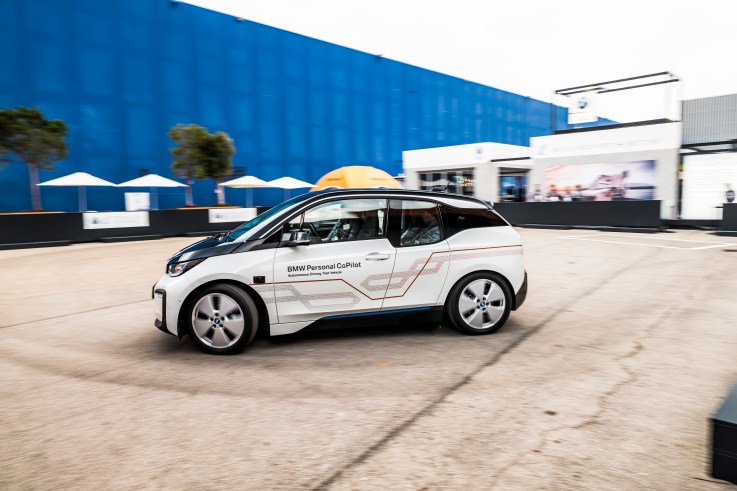
BMW wants to bring personal assistants to the car, but it doesn’t want to build its own. Instead, it wants to work with Amazon, Google, Microsoft and others to bring the best features of their platforms to its cars.
“We don’t want Alexa to drive our car. That’s not a good fit,” Dieter May, BMW’s senior VP for digital products and services, told me during in interview at MWC in Barcelona. “And I don’t want to buy diapers by saying: hey BMW, buy diapers.”
The personal digital assistant inside a BMW has to become the user’s alter ego. But that also means the team will have to learn about how drivers will communicate with the service — and even details like how a system like this would work with multiple passengers in the car remain to be solved. And all of this has to happen within a context of a brand that is very self-conscious about its premium status and whose customers have similarly high expectations. “The demand we put on ourselves is not to put an Echo Dot into a cup holder — we aim for a higher standard,” said May (and before you ask: yes, quite a few people have put Echo Dots into their cup holders).
For a while now, BMW has said that it plans to combine the best of the available assistants by integrating all of them into its BMW Connected platform. May argues that this is less of a technical issue and mostly a user interface problem.
For a premium brand like BMW, though, this isn’t about ceding any ground to these third-party services. The drivers, after all, should still feel like they are in a BMW and not a generic Alexa-enabled car. “You have to do this in a smart way,” said May. “My take is that every one of these external assistants stands for something.”
In the view of the BMW team, that mostly means Amazon’s Alexa is all about e-commerce, Google is all about search and Microsoft’s Cortana is about search plus productivity. In this vision, dispatching queries to the right service is what personal assistants in the car should be all about. It’s no secret that all of the major personal assistants in the market today have their eyes on all of those markets, though. Google, for example, would surely love it if you used your Google Home for shopping, too.
May doesn’t think that any of the major players will try to stop the company from building this kind of integration. He argues that BMW started its conversations with all of the major players early enough and that they won’t block the company from using this kind of dispatching system to route queries. “We talked to them early and we don’t have a plain vanilla deal with them,” said May, who also argued that the danger of the large technology players taking over the car’s head unit isn’t as large as it seemed a while back. “For large-volume manufacturers, maybe they want Alexa to handle the car’s windows, too. But that’s not an option for us,” said May.
“Alexa would surely love to send destinations to the car’s navigation system,” said May. “But hey — there’s also a lot of things that I want [and don’t get].”
As for the multiple assistants, May noted that in his view, Google is probably the leader as far as tech goes, but he also stressed that in his view, Cortana is pretty close — and closer than AWS. “But Amazon is a machine. You can see that with AWS and its cloud. The speed of innovation there is tremendous and they are also quickly getting better,” said May. “But for us, that’s good. […] This opens up opportunities for us because as a premium vendor, we’ve got pretty good standing with these companies. We’re interesting partners for them.”
BMW was never interested in building its own general assistant. “There are operators now who want to do this because they have a router in your home,” said May. “I think that’s reckless because even though the technology behind [IBM’s] Watson works well, it’s just a technology. The problem is that you may be able to do something with that in the B2B segment, but for us, it’s about understanding customers and if you don’t have this consumer context, which only Amazon, Microsoft and Google have, then you can’t build [a competitor] from scratch.” May also argued that even Bixby, Samsung’s digital assistant, may have a difficult road ahead (as every Bixby user surely knows).
“For us, this isn’t about saying that we’ll offer a better speech integration,” May said. “In a new 5-series BMW, you can already use speech to send destinations to your navigation systems. The added value here isn’t about being able to roll your windows up and down or using the climate controls. For us, what adds value is about how the speech recognition can work together with intelligent third-party services and the driver’s cloud profile.” Indeed, he stressed that it’s this cloud profile that should always inform how the personal assistant works.
The company that BMW seems to be working the closest with right now, though, is clearly Amazon and the team is taking its cues from products like the Echo Show, which adds visualization. BMW, too, plans to bring visualizations to its cars thanks to a deep integration with this tech stack.
Technologies like 5G networks will allow the car’s infotainment systems to communicate with cloud at higher speeds, but BMW is actually just as interested in the car as an edge computing node that can handle at least some of its own AI workloads. In the context of infotainment, though, 5G networks are mostly about that: speed and convenience.
The post BMW says in-car digital assistants have to go beyond being ‘Echo Dots in a cup holder’ appeared first on Article Pub.
from WordPress http://ift.tt/2F1KcpG


No comments:
Post a Comment